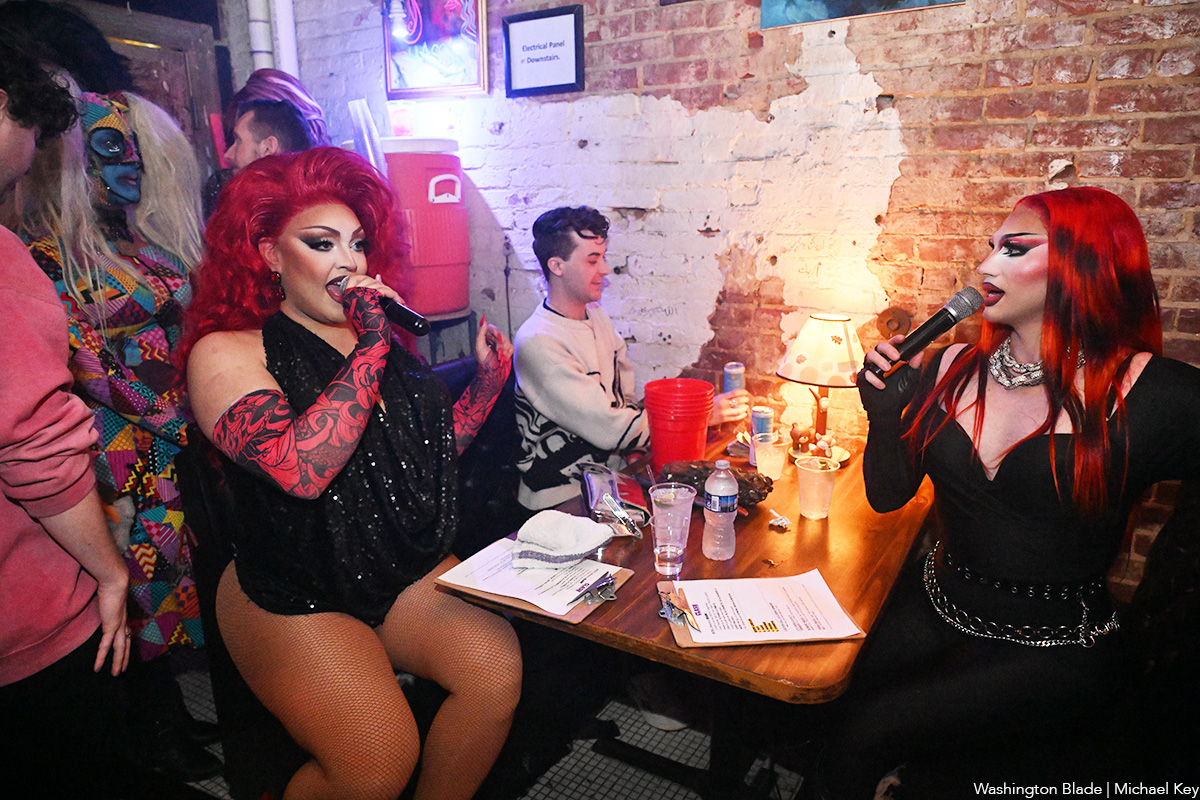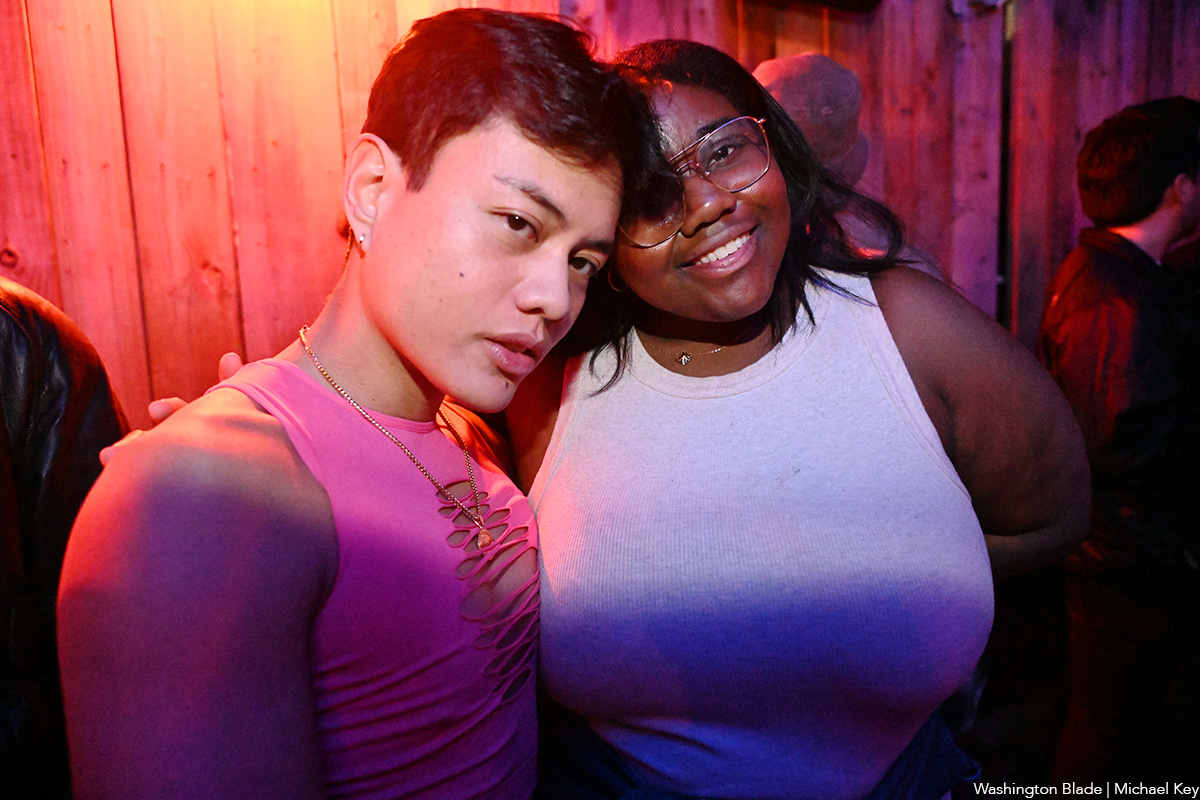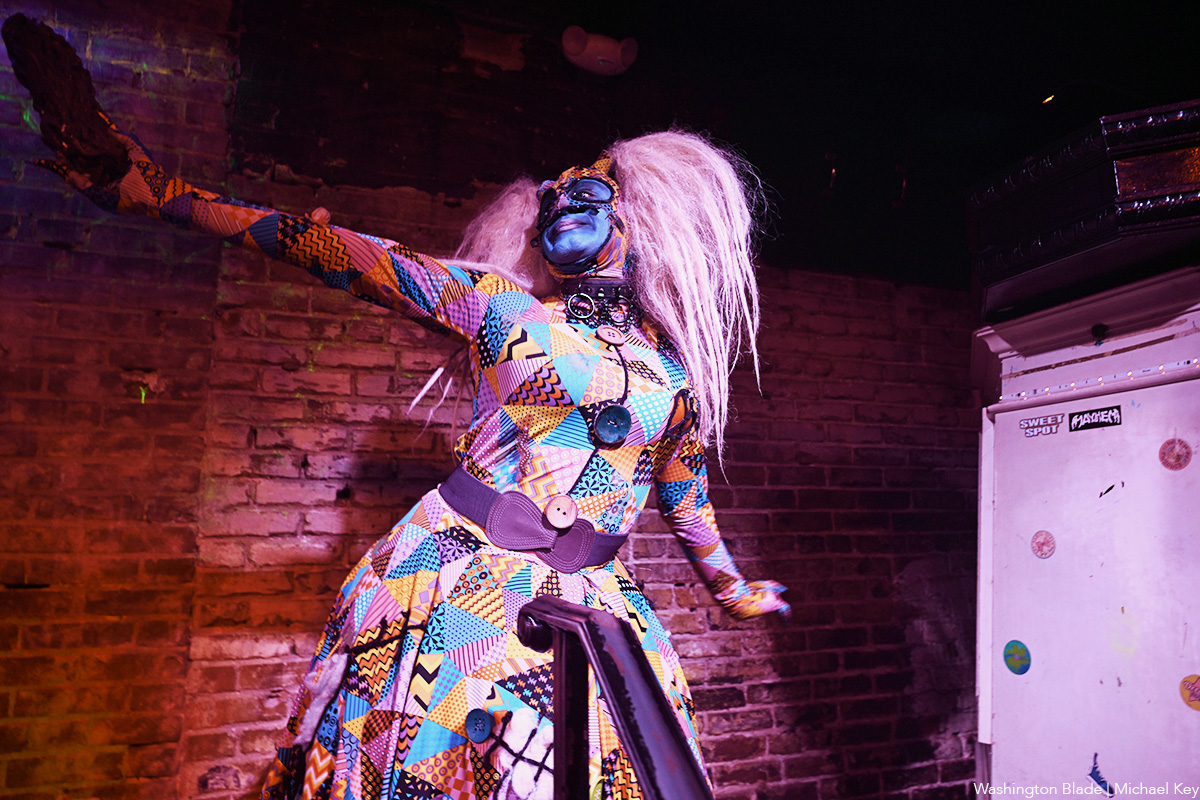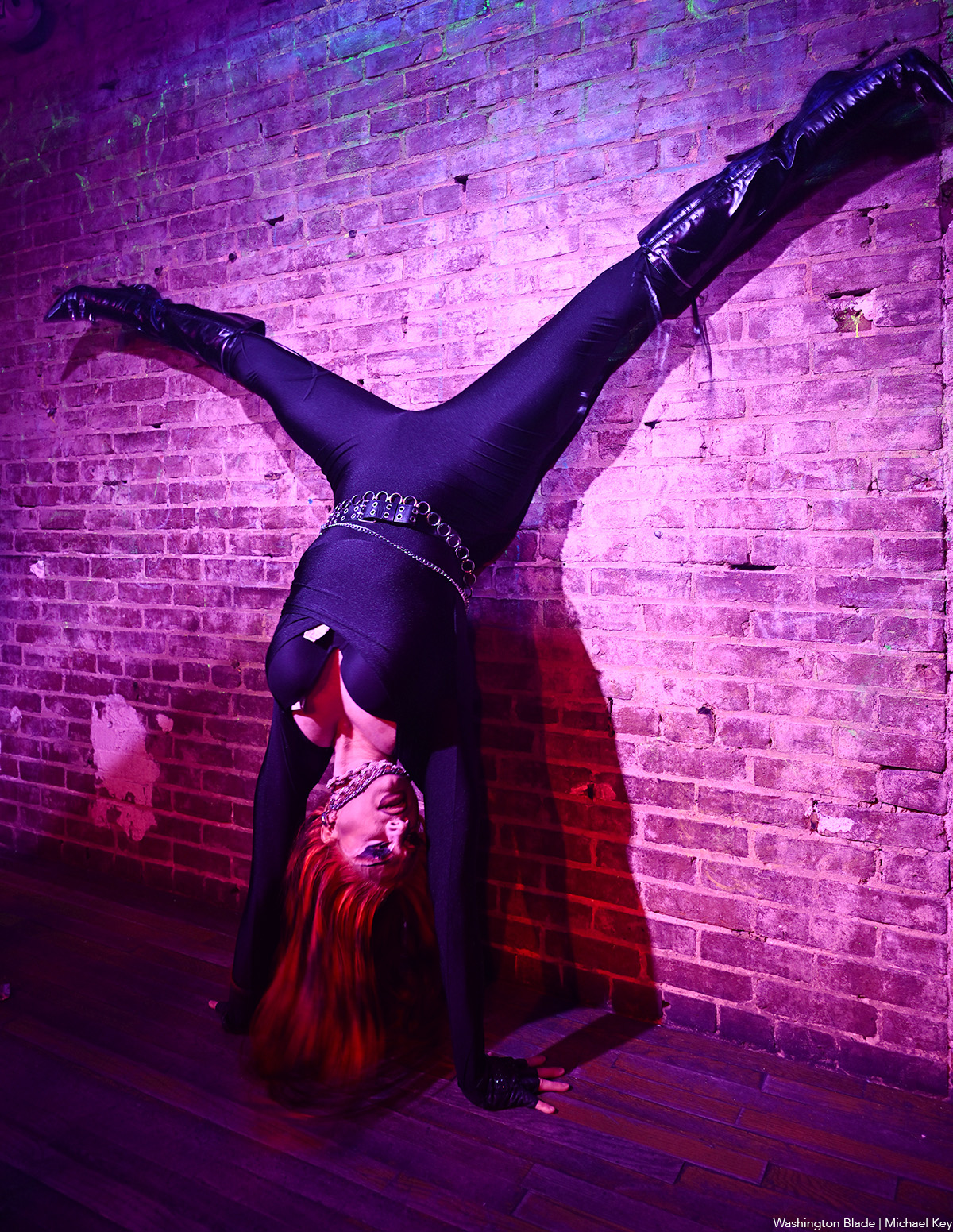Arts & Entertainment
Celebrating Ina Garten’s 13th cookbook with her biggest fan
Trent Pheifer has made all 1,272 of her recipes and counting

Ina Garten’s gay appeal is undeniable. From her fabulous home and gardens, to her creative cocktail recipes, to her many gay friends and over-the-top brunch parties, who wouldn’t want to count Ina as a friend?
He may not be on the brunch invitation list yet, but we can all live a bit vicariously through Trent Pheifer, 37, a home cook who chronicled his quest to cook all 1,272 of Garten’s recipes on Instagram (@storeboughtisfine), catching her eye and ultimately cooking with her on a Zoom event earlier this year.
To celebrate the release of Garten’s 13th cookbook this week, “Go-To Dinners,” the Blade sat down with Pheifer to talk all things Ina.
“She pulled me in, in a way that wasn’t about cooking,” Pheifer said. “She was always having a good time, it was approachable.”
Pheifer said that when he first started cooking he tried Julia Child, but ran into problems with her lengthy recipe for Beef Bourguignon.
“A lot of those recipes weren’t working out for me because I didn’t have the skills,” he said. “I had made a few of Ina’s recipes and everything was easy to read and gave me confidence in the kitchen and the results were delicious.”
Pheifer loved the film “Julie and Julia,” about a Julia Child fan who cooked all of the iconic chef’s recipes, and thought he would cook his way through Ina’s many recipes.
It took him nearly six and a half years, but he did it and in March of this year, he reached the end, culminating in a memorable Zoom event with Ina herself in which Pheifer cooked the final recipe, her Boston Cream Pie, a notoriously tricky dish.
What did he learn during all that time in the kitchen as an amateur cook?
“It’s about diving in — you just have to do it,” he says. “So many people think they aren’t good cooks because they’ve never cooked or they’ve tried something too complicated. … Don’t overdo it when getting started and slowly build.”
Pheifer noted that he was eating mostly prepared foods from Trader Joe’s when he started and now can make anything in Ina’s vast repertoire. But learning to cook isn’t all about impressing dinner guests with fancy dishes. Pheifer, who’s gay and works as a fundraiser for the Advertising Council in New York City, said the bigger lesson was discovering his self-confidence.

“I’ve always struggled with self-confidence — not being good enough or smart enough – and I think in the last seven years of this project my confidence has skyrocketed,” he said. “Having worked hard at something and being recognized, having fun with people, I found confidence in being myself and that has spilled over into my job and life. I wouldn’t be where I am without it.”
Pheifer also shared his thoughts on Ina’s appeal to gay men, noting that about half of his Instagram followers are men, most of whom he assumes are gay.
“A lot of gay men are attracted to strong women,” he said. “A lot of gay boys grew up with ‘Barefoot Contessa’ and a lot of her friends are gay and it’s a place you knew you were welcome. She never waved the Pride flag, but I knew I would be welcomed into her home.”
Aside from baking cookies with his mother and grandmother as a child, Pheifer didn’t grow up with an interest in the kitchen, though he noted the family sat down to dinner most nights together. By college he wasn’t cooking at all.
“When I was approaching 30 I realized I didn’t know how to cook for myself and it’s expensive to go out to dinner every day,” he said. Julia Child inspired him at first, until that run-in with the Beef Bourguignon. After discovering Ina’s recipes were more approachable, he only encountered one bad experience while cooking his way through her books: vegetable lasagna.
The recipe calls for roasting three trays of vegetables and making a sauce — not an easy feat in a small New York City kitchen. “There were too many elements at the same time,” he says.
Undeterred by the laborious lasagna recipe, Pheifer soldiered on for nearly seven years, sometimes wondering if all his efforts and Instagram posts would be noticed. He says he didn’t start the project hoping to get media attention, but there were thoughts that maybe all of this could lead somewhere.
“At some point you get years into the project and wonder, will anyone notice,” he said. “Ina is so beloved that she inspired this fan base of people who love her and I think I got lucky that no one else was doing it already.” He added that he didn’t do any outreach and the subsequent media attention was organic and came via word of mouth.
One highlight of Pheifer’s culinary journey came unexpectedly while on a vacation in Paris, which happens to be Ina Garten’s favorite city where she and husband Jeffrey own an apartment. He was on a foodie trip with friends and snagged a coveted table at Verjus, known for its tasting menu, when he spotted Ina and Jeffrey at a table in the intimate dining room. When they finished, Pheifer summoned the courage to approach his culinary idol.
“It was kismet,” he says, “the color ran from my face. I approached after they finished and my friend knocked over their bottle of wine as I was shaking their hands.”
He introduced himself as the man behind @storeboughtisfine and Ina immediately recognized him and they posed for a photo.
“I couldn’t think of a more magical way to meet her,” he said, “this was such an intimate experience and in the city she loves the most. Ina is obsessed with Paris so it was a magical moment.”
With Ina’s new book out Oct. 25, Pheifer says he will continue his quest to cook all of the recipes. He plans to tackle two or three each week.
And if Pheifer could pick the theme for Ina’s 14th cookbook, he says it would be “Store Bought is Fine.” Ina has said her next book will be a memoir and Pheifer hopes she will write about what drives her to create.
Although Pheifer turns to Ina for French, Italian, and American dishes, he said he collects all sorts of cookbooks and his favorite this year is “Korean American” by New York Times writer Eric Kim.
As for Pheifer’s favorite Ina recipe to make, he says it’s her rigatoni with sausage and fennel from “Cooking with Jeffrey.” Least favorite: pear and parsnip gratin. His go-to Ina dinner: Shrimp and Linguini Fra Diavolo with Outrageous Garlic Bread. Go-to dessert: Mocha Iced Box Cake. And his favorite Ina cookbook is “Barefoot Contessa At Home.”
Ina Garten’s latest, “Go-To Dinners” is out Oct. 25 from Clarkson Potter and includes breakfast-for-dinner options, make-ahead ideas, and simply assembled dishes.

The Blade may receive commissions from qualifying purchases made via this post.
Sports
US wins Olympic gold medal in women’s hockey
Team captain Hilary Knight proposed to girlfriend on Wednesday

The U.S. women’s hockey team on Thursday won a gold medal at the Milan Cortina Winter Olympics.
Team USA defeated Canada 2-1 in overtime. The game took place a day after Team USA captain Hilary Knight proposed to her girlfriend, Brittany Bowe, an Olympic speed skater.
Cayla Barnes and Alex Carpenter — Knight’s teammates — are also LGBTQ. They are among the more than 40 openly LGBTQ athletes who are competing in the games.
The Olympics will end on Sunday.
Movies
Radical reframing highlights the ‘Wuthering’ highs and lows of a classic
Emerald Fennell’s cinematic vision elicits strong reactions

If you’re a fan of “Wuthering Heights” — Emily Brontë’s oft-filmed 1847 novel about a doomed romance on the Yorkshire moors — it’s a given you’re going to have opinions about any new adaptation that comes along, but in the case of filmmaker Emerald Fennell’s new cinematic vision of this venerable classic, they’re probably going to be strong ones.
It’s nothing new, really. Brontë’s book has elicited controversy since its first publication, when it sparked outrage among Victorian readers over its tragic tale of thwarted lovers locked into an obsessive quest for revenge against each other, and has continued to shock generations of readers with its depictions of emotional cruelty and violent abuse, its dysfunctional relationships, and its grim portrait of a deeply-embedded class structure which perpetuates misery at every level of the social hierarchy.
It’s no wonder, then, that Fennell’s adaptation — a true “fangirl” appreciation project distinguished by the radical sensibilities which the third-time director brings to the mix — has become a flash point for social commentators whose main exposure to the tale has been flavored by decades of watered-down, romanticized “reinventions,” almost all of which omit large portions of the novel to selectively shape what’s left into a period tearjerker about star-crossed love, often distancing themselves from the raw emotional core of the story by adhering to generic tropes of “gothic romance” and rarely doing justice to the complexity of its characters — or, for that matter, its author’s deeper intentions.
Fennell’s version doesn’t exactly break that pattern; she, too, elides much of the novel’s sprawling plot to focus on the twisted entanglement between Catherine Earnshaw (Margot Robbie), daughter of the now-impoverished master of the titular estate (Martin Clunes), and Heathcliff (Jacob Elordi), a lowborn child of unknown background origin that has been “adopted” by her father as a servant in the household. Both subjected to the whims of the elder Earnshaw’s violent temper, they form a bond of mutual support in childhood which evolves, as they come of age, into something more; yet regardless of her feelings for him, Cathy — whose future status and security are at risk — chooses to marry Edgar Linton (Shazad Latif), the financially secure new owner of a neighboring estate. Heathcliff, devastated by her betrayal, leaves for parts unknown, only to return a few years later with a mysteriously-obtained fortune. Imposing himself into Cathy’s comfortable-but-joyless matrimony, he rekindles their now-forbidden passion and they become entwined in a torrid affair — even as he openly courts Linton’s naive ward Isabella (Alison Oliver) and plots to destroy the entire household from within. One might almost say that these two are the poster couple for the phrase “it’s complicated.” and it’s probably needless to say things don’t go well for anybody involved.
While there is more than enough material in “Wuthering Heights” that might easily be labeled as “problematic” in our contemporary judgments — like the fact that it’s a love story between two childhood friends, essentially raised as siblings, which becomes codependent and poisons every other relationship in their lives — the controversy over Fennell’s version has coalesced less around the content than her casting choices. When the project was announced, she drew criticism over the decision to cast Robbie (who also produced the film) opposite the younger Elordi. In the end, the casting works — though the age gap might be mildly distracting for some, both actors deliver superb performances, and the chemistry they exude soon renders it irrelevant.
Another controversy, however, is less easily dispelled. Though we never learn his true ethnic background, Brontë’s original text describes Heathcliff as having the appearance of “a dark-skinned gipsy” with “black fire” in his eyes; the character has typically been played by distinctly “Anglo” men, and consequently, many modern observers have expressed disappointment (and in some cases, full-blown outrage) over Fennel’s choice to use Elordi instead of putting an actor of color for the part, especially given the contemporary filter which she clearly chose for her interpretation for the novel.
In fact, it’s that modernized perspective — a view of history informed by social criticism, economic politics, feminist insight, and a sexual candor that would have shocked the prim Victorian readers of Brontë’s novel — that turns Fennell’s visually striking adaptation into more than just a comfortably romanticized period costume drama. From her very opening scene — a public hanging in the village where the death throes of the dangling body elicit lurid glee from the eagerly-gathered crowd — she makes it oppressively clear that the 18th-century was not a pleasant time to live; the brutality of the era is a primal force in her vision of the story, from the harrowing abuse that forges its lovers’ codependent bond, to the rigidly maintained class structure that compels even those in the higher echelons — especially women — into a kind of slavery to the system, to the inequities that fuel disloyalty among the vulnerable simply to preserve their own tenuous place in the hierarchy. It’s a battle for survival, if not of the fittest then of the most ruthless.
At the same time, she applies a distinctly 21st-century attitude of “sex-positivity” to evoke the appeal of carnality, not just for its own sake but as a taste of freedom; she even uses it to reframe Heathcliff’s cruel torment of Isabella by implying a consensual dom/sub relationship between them, offering a fragment of agency to a character typically relegated to the role of victim. Most crucially, of course, it permits Fennell to openly depict the sexuality of Cathy and Heathcliff as an experience of transgressive joy — albeit a tormented one — made perhaps even more irresistible (for them and for us) by the sense of rebellion that comes along with it.
Finally, while this “Wuthering Heights” may not have been the one to finally allow Heathcliff’s ambiguous racial identity to come to the forefront, Fennell does employ some “color-blind” casting — Latif is mixed-race (white and Pakistani) and Hong Chau, understated but profound in the crucial role of Nelly, Cathy’s longtime “paid companion,” is of Vietnamese descent — to illuminate the added pressures of being an “other” in a world weighted in favor of sameness.
Does all this contemporary hindsight into the fabric of Brontë’s epic novel make for a quintessential “Wuthering Heights?” Even allowing that such a thing were possible, probably not. While it presents a stylishly crafted and thrillingly cinematic take on this complex classic, richly enhanced by a superb and adventurous cast, it’s not likely to satisfy anyone looking for a faithful rendition, nor does it reveal a new angle from which the “romance” at its center looks anything other than toxic — indeed, it almost fetishizes the dysfunction. Even without the thorny debate around Heathcliff’s racial identity, there’s plenty here to prompt purists and revisionists alike to find fault with Fennell’s approach.
Yet for those looking for a new window into to this perennial classic, and who are comfortable with the radical flourish for which Fennell is already known, it’s an engrossing and intellectually stimulating exploration of this iconic story in a way that exchanges comfortable familiarity for unpredictable chaos — and for cinema fans, that’s more than enough reason to give “Wuthering Heights” a chance.

Crimsyn and Tatianna hosted the new weekly drag show Clash at Trade (1410 14th Street, N.W.) on Feb. 14, 2026. Performers included Aave, Crimsyn, Desiree Dik, and Tatianna.
(Washington Blade photos by Michael Key)













-

 Baltimore4 days ago
Baltimore4 days ago‘Heated Rivalry’ fandom exposes LGBTQ divide in Baltimore
-

 Real Estate4 days ago
Real Estate4 days agoHome is where the heart is
-

 District of Columbia3 days ago
District of Columbia3 days agoDeon Jones speaks about D.C. Department of Corrections bias lawsuit settlement
-

 European Union3 days ago
European Union3 days agoEuropean Parliament resolution backs ‘full recognition of trans women as women’



















